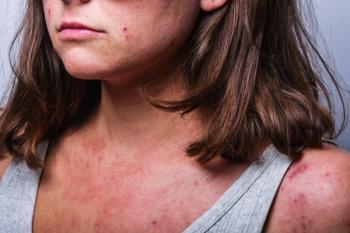
Use of monoclonal antibodies for idiopathic chronic eosinophilic pneumonia
Management of ICEP with monoclonal antibodies against IL-5 and IgE (omalizumab) could be promising according to study authors, though extent of evidence is lacking.
The rare disease of idiopathic chronic eosinophilic pneumonia (ICEP) is characterized by pulmonary radiological alterations, peripheral eosinophilia, and demonstrated pulmonary eosinophilia. Standard management comes in the form of oral steroids (OS), though relapses occur in up to half of patients during decrease or suspension of steroids, generally leading to re-initiation of treatment.
Investigators of a study published in BMC Pulmonary Medicine aimed to describe the type of evidence and extent of research regarding the use of monoclonal antibodies for ICEP, to control the disease and limit secondary effects.
ICEP has a subacute presentation featuring chronic respiratory symptoms such as cough, fatigue, fever, diaphoresis, arthralgia, and weight loss. Loss of lung function occurs during the progression of the disease in approximately 10% of patients. OS for 3 to 6 months is standard management of ICEP, though the potential deleterious side effects of OS “have made it necessary to evaluate additional treatments that allow us to control the disease and avoid complications,” the study authors wrote.
The investigative team conducted a panoramic review of literature, including observational and experimental studies of pediatric and adult populations that managed recurrent ICEP with monoclonal antibodies. Selected articles were reviewed by 2 independent observers, with a third to resolve any eligibility disagreements. Literature included in the study could be case reports published in journals, cohort studies, academic sessions of poster presentations, and letters to the editor. Studies addressed pediatric and adult patients with an ICEP diagnosis who required management with monoclonal antibodies.
A total of 937 studies were found, with 37 eligible for final analysis after inclusion and exclusion criteria. The final analysis consisted of a retrospective, observational, real-life study, 2 case series publications, and 34 case reports published in academic poster sessions and letters to the editor.
Overall, 63 patients received monoclonal antibody management. The median age was 49 years (57.5-31) and 70.5% were women. Breakdown of antibodies received is below:
- 31 received mepolizumab
- 14 received benralizumab
- 5 received omalizumab
- 1 received dupilumab
Ten patients in an open, retrospective study with relapsing ICEP were included in the analysis. Six received mepolizumab at a dose of 100 mg every 4 weeks. Four received 300 mg every 4 weeks, with a median follow-up of 9 months after start of mepolizumab. No significant differences in disease response were associated with different dosing, though a significant reduction in both doses was observed in the annual relapse rate, both falling to a value of 0.
In another retrospective case series included in the final analysis, 12 of 53 patients were treated with mepolizumab or benralizumab. All patients achieved sustained clinical improvement, including lung function. No relapses were reported, and all patients lowered their respective OS dosage. In this study, treatment allocation was not described, nor was duration of follow-up or dosage used.
Among case reports included in the final analysis, 19 patients received management with mepolizumab, while 12 were treated with benralizumab, 5 with
In the same group, a 16-year-old male patient who received benralizumb had an “immediate clinical improvement, allowing reduction and suspension of OS, evolv[ed] without relapses and with improvement in lung function.” The third individual under 18 years of age was a 17-year-old who received omalizumab. The patient had an observation period of 33 months. After 9 months, an adequate response was observed with improvement of symptoms. No relapses were reported during follow-up, and the patient demonstrated radiological improvement.
“In general, the use of monoclonal antibodies approved for severe asthma could be useful for the control of ICEP, since most of the results show a good response for clinical and radiological outcomes,” wrote the investigative team. “Biological drugs seem to be a safer option for controlling relapses in ICEP, allowing lowering/suspension of OSs, and sometimes replacing them in patients intolerant to them, patients with significant comorbidities, and patients who have already developed adverse events.”
For patients who present frequent relapses, for cortico-dependent individuals, or in patients in whom the use of steroids is contraindicated, management of ICEP with monoclonal antibodies against IL-5 and IgE (omalizumab) could be promising according to study authors, though extent of evidence is lacking.
The authors called for studies with better design and structure "to evaluate quality of life and outcomes during a clear follow-up period.”
Reference:
Murillo, A.D., Castrillon, A.I., Serrano, C.D. et al. Monoclonal antibodies in idiopathic chronic eosinophilic pneumonia: a scoping review. BMC Pulm Med 24, 74 (2024). https://doi.org/10.1186/s12890-024-02868-3
Newsletter
Access practical, evidence-based guidance to support better care for our youngest patients. Join our email list for the latest clinical updates.






